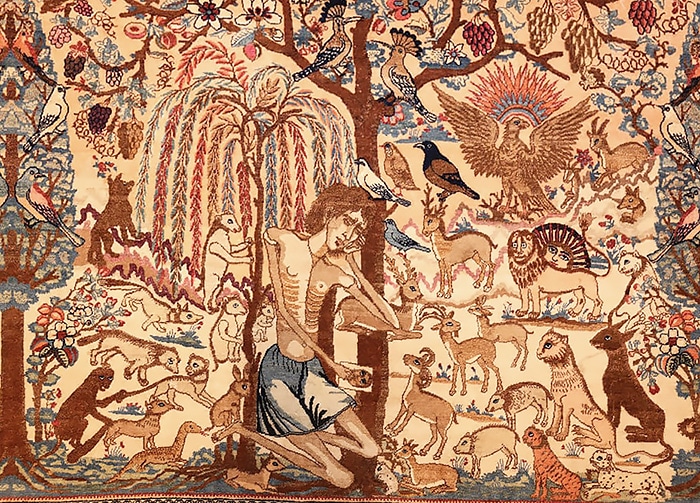FWP:
SETS
DESERT: {3,1}
HOME: {14,9}
Many modern divan editions have har ik instead of har yak ; as always I follow Arshi. His is definitely the better reading, because the tendency with har ik is to read it with word-grafting, which here would be unmetrical; ditto for har ek .
The first line offers a kind of dry, abstract, general statement, one that is destined, in the ghazal world, to be backed up by a 'proof', or illustrated by an example of some kind. Naturally, we are curious to hear the second line. And when we get the second line-- after, under mushairah conditions, a suitably piquant delay-- we are lavishly rewarded with its gorgeous sound effects and rich range of meanings.
Monier Williams in his Sanskrit-English Dictionary defines udās (literally, 'aside' + 'sit') as 'to sit separate or away from, sit on one side or apart; to abstain from participating in; to take no interest in, be unconcerned about, be indifferent or passive' (Delhi: Motilal Banarsidass, 1974 [1899], p.185). This conspicuously Hindi-side word surely counts as a 'fresh word'; this is its only occurrence in the divan. As can be seen from Platts's definition above, the meanings that have accrued to it over time all come directly from that primary concept of being seated apart, with its implications of sadness, indifference, isolation. Here are some of the possible readings:
=Because Majnun has died, the wilderness has been in full mourning; it has been paying the tribute of grief to the one whose residence gave it the 'nobility' to feel such honorable emotions.
=Because Majnun has died, the wilderness is sad; it knows it will now be an empty shell, like an abandoned house; it will no longer have the kind of prestige and honor that it did when he dwelt in it.
=Because Majnun has died, the wilderness is indifferent and solitary; it now holds itself aloof from human affairs, as is appropriate for one of high rank who will tolerate no inferior company.
=Because Majnun has died, the wilderness is now neglected and ignored; nobody cares about it any more, since it's of no more value than a long-abandoned house.
There's also Nazm's reading: the reason that the wilderness is so wild, desolate, remote, forbidding, is that Majnun has died; otherwise, it would not have been so. On this reading, the verse becomes a witty example of 'elegance in assigning a cause': the obvious fact that the wilderness-- and jangal in Urdu is much broader than the English derivative 'jungle'-- is wild, desolate, etc., is no mere happenstance of nature, but rather a direct result of Majnun's death.
And surely the second line is one of the most resonant and haunting ones in the whole divan. But when I try to analyze the reasons, I find it hard to put my finger any single one. Maybe it's not just sound effects, but also a case of mood. There's also the fact that the semantic structure of the line fits with complete perfection into the metrical foot pattern. And the sound effects are there: all the resonant long vowels, contrasted powerfully with the three clipped, short-a consonantal syllables mar and jan and gal . Try it yourself-- see if this line isn't very easy to memorize, and enjoyably resonant to recite.
A terrific verse for comparison is {18,3},
another meditation on Majnun's wilderness 'house'. Also compare {4,15x},
on the relation between the 'owner' and the 'house'.


Nazm:
That is, this is the reason that the wilderness is udās ; otherwise, it would not have been udās . (151)
== Nazm page 151